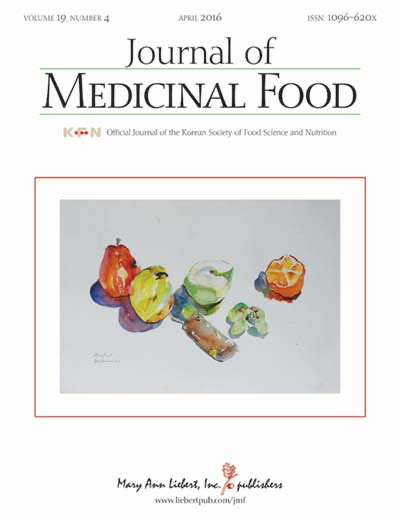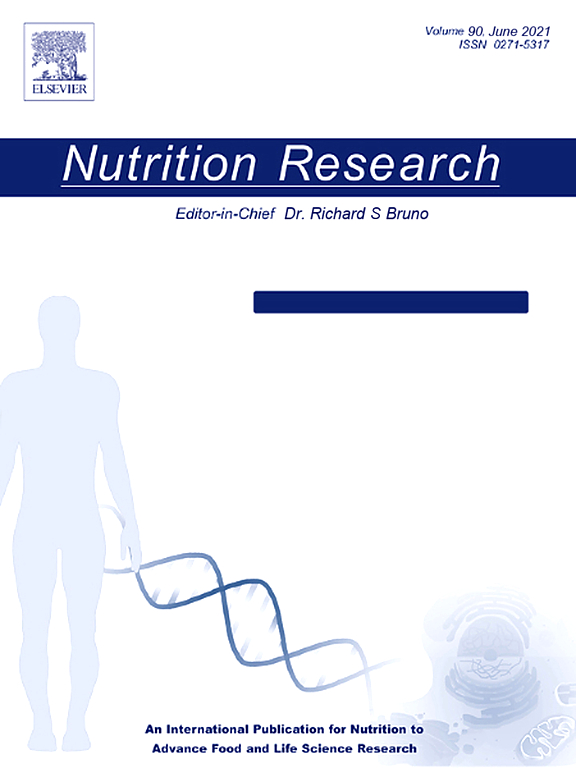Pecan
How to submit an article:
- Registered users can submit any published journal article that has a unique DOI (Digital Object Identifier) name or link to Research Hub.
- For example, you can paste the full DOI link:
https://doi.org/10.1109/5.771073or just the DOI name:10.1109/5.771073into the field above and click submit. - The person who is first to submit a valid article to Research Hub will forever be credited for it, and every article submission earns you +6 Research Points.
Published research studies are articles that present the findings of original research that has undergone a peer-review process and has been made publicly available in scholarly journals, books or other media.

A 4-Week Pecan-Enriched Diet Improves Postprandial Lipid Peroxidation in Aging Adults
2023 Sep 01 Journal of Medicinal Food Cogan B, Pearson RC, Jenkins NT, Paton CM, Cooper JA
Randomised Controlled Trial Oxidative Stress Pecan Postprandial Oxidative StressDaily consumption of pecans for a month can help protect against post-meal oxidative stress in aging adults.

Pecan-enriched diet improves cholesterol profiles and enhances postprandial microvascular reactivity in older adults
2023 Mar Nutrition Research Cogan B, Pearson RC, Paton CM, Jenkins NT, Cooper JA
Daily consumption of 68 g of pecans for 4 weeks resulted in greater reductions in fasting total cholesterol, low-density lipoprotein (LDL) cholesterol, non-high-density lipoprotein cholesterol, LDL particle number, and LDL medium compared to a nut-free diet. Postprandial triglyceride levels were suppressed with pecan consumption, and improvements in microvascular reactivity were observed. Fasting macro- and microvascular function remained unaffected. The findings suggest that pecan consumption may contribute to improved vascular health and reduced cardiovascular risk in older adults.
Clinical Study Randomised Controlled Trial Cholesterol
Pecan‐enriched diets increase energy expenditure and fat oxidation in adults at‐risk for cardiovascular disease in a randomised, controlled trial
2021 Nov 28 Journal of Human Nutrition and Dietetics Guarneiri LL, Paton CM, Cooper JA
Daily consumption of pecans may increase select measures of energy expenditure and fat oxidation in adults at-risk for cardiovascular disease.
Randomised Controlled Trial Cardiovascular Disease Energy Expenditure Fat Oxidation
Pecan-enriched diets decrease postprandial lipid peroxidation and increase total antioxidant capacity in adults at-risk for cardiovascular disease
2021 Sep Nutrition Research Guarneiri LL, Paton CM, Cooper JA
Daily pecan consumption, either as part of the diet or as a substitution for isocaloric foods, resulted in suppressed postprandial lipid peroxidation and elevated postprandial TAC. Fasting γ-tocopherol levels also increased in both pecan groups. These findings suggest that regular pecan consumption has a protective effect against oxidative stress following a high-fat meal in adults at risk for CVD.
Clinical Study Randomised Controlled Trial Cardiovascular Disease Oxidative StressResearch insights are moderated by the Research Hub team and offer an at-a-glance overview of interesting research findings.

2023 Journal of Medicinal Food
Daily consumption of pecans for a month can help protect against post-meal oxidative stress in aging adults.
Randomised Controlled Trial Oxidative Stress Postprandial Oxidative Stress
A 4-Week Pecan-Enriched Diet Improves Postprandial Lipid Peroxidation in Aging Adults
Cogan B, Pearson RC, Jenkins NT, Paton CM, Cooper JA
Review Articles
Review articles summarise and critically evaluate the current state of research on a specific topic or field by synthesising multiple primary research studies.
Clinical Trials
Clinical trials are research studies that involve people and are conducted to evaluate the safety and efficacy of new treatments or interventions, such as drugs, medical devices, or behavioural therapies.

A 4-Week Pecan-Enriched Diet Improves Postprandial Lipid Peroxidation in Aging Adults
2023 Sep 01 Journal of Medicinal Food Cogan B, Pearson RC, Jenkins NT, Paton CM, Cooper JA
Randomised Controlled Trial Oxidative Stress Pecan Postprandial Oxidative StressDaily consumption of pecans for a month can help protect against post-meal oxidative stress in aging adults.

Pecan-enriched diet improves cholesterol profiles and enhances postprandial microvascular reactivity in older adults
2023 Mar Nutrition Research Cogan B, Pearson RC, Paton CM, Jenkins NT, Cooper JA
Daily consumption of 68 g of pecans for 4 weeks resulted in greater reductions in fasting total cholesterol, low-density lipoprotein (LDL) cholesterol, non-high-density lipoprotein cholesterol, LDL particle number, and LDL medium compared to a nut-free diet. Postprandial triglyceride levels were suppressed with pecan consumption, and improvements in microvascular reactivity were observed. Fasting macro- and microvascular function remained unaffected. The findings suggest that pecan consumption may contribute to improved vascular health and reduced cardiovascular risk in older adults.
Clinical Study Randomised Controlled Trial Cholesterol
Pecan‐enriched diets increase energy expenditure and fat oxidation in adults at‐risk for cardiovascular disease in a randomised, controlled trial
2021 Nov 28 Journal of Human Nutrition and Dietetics Guarneiri LL, Paton CM, Cooper JA
Daily consumption of pecans may increase select measures of energy expenditure and fat oxidation in adults at-risk for cardiovascular disease.
Randomised Controlled Trial Cardiovascular Disease Energy Expenditure Fat Oxidation
Pecan-enriched diets decrease postprandial lipid peroxidation and increase total antioxidant capacity in adults at-risk for cardiovascular disease
2021 Sep Nutrition Research Guarneiri LL, Paton CM, Cooper JA
Daily pecan consumption, either as part of the diet or as a substitution for isocaloric foods, resulted in suppressed postprandial lipid peroxidation and elevated postprandial TAC. Fasting γ-tocopherol levels also increased in both pecan groups. These findings suggest that regular pecan consumption has a protective effect against oxidative stress following a high-fat meal in adults at risk for CVD.
Clinical Study Randomised Controlled Trial Cardiovascular Disease Oxidative StressStudy Protocols
Published study protocols are detailed plans that outline the objectives, methodology, statistical analyses, and organisation of a research study that have been made publicly available for others to review and use as a reference.
Presentation Slides

Randomised Controlled Trial
Daily consumption of pecans for a month can help protect against post-meal oxidative stress in aging adults.
Cogan B, Pearson RC, Jenkins NT, Paton CM, Cooper JA
Executive Summary
Write an executive summary in the form of a blog article on the topic of "Research into Chinese medicine treatment for Pecan" summarising the research below and using language that can be easily understood by patients and avoiding medical jargon using a professional and caring tone of voice.
Write an executive summary in the form of a blog article on the topic of "Researched Chinese medicine treatments for Pecan" summarising the research below in an objective and easy to understand way, and using language that can be easily understood by patients. Group the article into Chinese medicine treatments first, followed by nutrition and other treatments. Avoid using medical jargon and use a professional and caring tone of voice.
Write me a concise but easy to understand executive summary on the topic of "Chinese medicine treatments for Pecan" based on the following research that I will give you. Your summary should be 2 paragraphs long in Australian English spelling and include references to the studies.
A Randomised Controlled Trial published in 2023 in the journal Journal of Medicinal Food found that Daily consumption of pecans for a month can help protect against post-meal oxidative stress in aging adults. The abstract outlines a randomized, parallel, controlled trial where 41 healthy adults aged between 50 and 75 were split into two groups. One group consumed 68 grams of pecans every day for four weeks, while the other group avoided all nuts. Blood samples were obtained from all participants before and after the intervention during fasting and at intervals of 30, 60, and 120 minutes after a meal high in saturated fats. Changes were observed in various parameters, including malondialdehyde - a marker for lipid peroxidation, total antioxidant capacity (TAC), glucose, and insulin levels. The study revealed no significant variances in fasting or post-meal TAC, glucose, or insulin for the pecan consumers compared to the control group. However, there was a noticeable tendency towards a change in fasting lipid peroxidation driven by a minor reduction for the pecan group compared to the control group. Moreover, post-meal lipid peroxidation was suppressed in the pecan group, distinctly different from the control group's results. These outcomes propose that a diet enriched in pecans for one month can provide protection against post-meal oxidative stress in older adults.
Moderation Tools
Topic
Sign In
Users not signed in are limited to viewing the 5 most recent items of content.